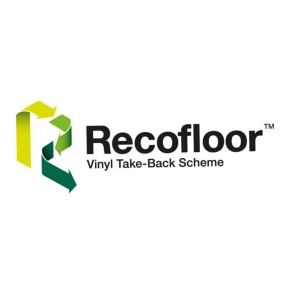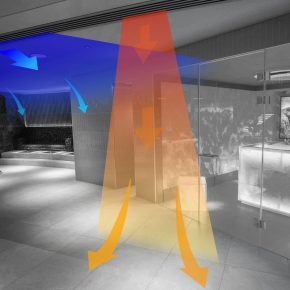
Reducing carbon footprint of vinyl flooring with Recofloor
Flooring companies participating in the Recofloor commercial waste vinyl flooring take back scheme are contributing to a greener outlook for the sector by reducing the carbon footprint of their activities. Carla Eslava, Recofloor Scheme Manager, explains how it works.

“Growing interest in environmental issues coupled with pressure on the construction industry to reduce its carbon footprint is forcing more businesses to examine what they can do better to reduce and recycle the waste generated at every stage of the installation phases.
“Set up in 2009 by flooring manufacturers Altro and Polyflor to divert growing volumes of waste vinyl flooring from landfill, Recofloor is a leading example of how a sustainable collection service for this recyclable waste material can contribute towards a circular economy and savings on CO2 emissions. Collecting vinyl flooring through Recofloor ensures material gets a second life beyond the product’s first use, saving on raw material resources and recovering PVC for reuse, potentially for decades.
“Recofloor has calculated that, on average, recycling PVC flooring through its scheme is estimated to save 1.17 tonnes of CO2 for every tonne of flooring recycled.
“This calculation is based on several factors such as the volumes collected, distance travelled, transport vehicles’ efficiency and the material processing and recycling process of displacing concrete in traffic management products, the primary application for the recycled flooring. In the past, most of the pressure was on manufacturers, but now everyone in the industry plays a role in reducing carbon footprints of their operations and organisations are taking a more environmentally conscious approach to waste management.
“Collections of acceptable materials, such as Luxury Vinyl Tiles (LVTs), smooth, safety and loose lay vinyl offcuts, roll-ends and uplifted, are available from Recofloor throughout the UK giving the flooring industry a sustainable route to dispose of waste vinyl flooring, helping the sector to reduce its carbon footprint.
“Recofloor-registered contractors and fitters are encouraged to use the free drop-off locations and drop off small volumes of waste vinyl when buying or collecting supplies for new projects at their local participating flooring distributors’ premises. This enables small quantities of waste to be bulked up with distributors’ volumes.
“Some distributors can offer a collection service when they are delivering materials to customers for later collection by Recofloor at their premises. These are the best options from an environmental perspective to reduce the number of vehicle journeys on the road.
“When the free drop off is not an option due to larger volumes, contractors can bulk material at their own premises or directly from a working site and book the collections. These are the more cost-effective options for contractors as Recofloor collections are typically less costly than paying for waste disposal, saving up to 70% when compared to landfill.
“Although collections across the UK present challenges in terms of transport arrangements which could have an impact on the environment, the use of Altro and Polyflor’s transport is vital in reducing vehicles on the road by backhauling the Recofloor collections, where possible, when new flooring is delivered. When backhauling is not possible, Recofloor can use a pallet network transport system or choose the best environmental option. All this helps to reduce the impact on the environment and saves on carbon emissions.
“All the material collected by Recofloor goes back to Polyflor and Altro for sorting. They recycle suitable material into new flooring, while unsuitable material is sent for recycling into long-life traffic management products, such as traffic cones and sign bases. This means used vinyl is given at least another 10 years’ life in durable products that can ultimately be recycled again.
“Key to the scheme’s success is regular communication and engagement with our 500-plus members as we rely on their individual efforts to capture the vinyl flooring for recycling. Without their involvement, the scheme would not be possible. Clear specifications for collected material and a nationwide collection system based on efficient logistics are also important.”
More than 6,000 tonnes of waste vinyl flooring have been collected through Recofloor since the scheme started in 2009. This has produced 7,038 tonnes of carbon savings – equivalent to taking 1,837 cars off the road for a year.
It also equates to two million square metres of vinyl flooring having been recycled – enough to cover 276 football pitches. In 2021 alone, 578 tonnes of waste vinyl flooring were collected through Recofloor, saving 678 tonnes of carbon emissions that year.
As well as the environmental benefits, participating in the Recofloor scheme helps construction companies and large contractors showcase their sustainable credentials and earn certification points for accredited schemes, such as BREEAM, SKA and LEED.
Recofloor members receive a Certificate of Commitment as evidence of their participation in the scheme after their first collection. They can also request a statement letter showing the amount of material collected for a particular project or period of time. If tendering for a new project and they want to show the potential CO2 savings, this can also be added to the statement letter if they provide the project’s square meterage.
With proof of what material has been collected, flooring contractors or construction companies can apply for BREEAM points and environmental certificates. This elevates their ‘sustainability status’ and promoting their involvement in the Recofloor scheme raises awareness, helping to attract more business, especially where evidence of recycling is a requirement in tender processes.
Julian Normie, Managing Director at Bramhall Flooring, comments: “We believe that recycling helps the environment and doesn’t contribute to overloaded landfill sites. We have been asked several times to provide evidence that we recycle as this helps clients with their BREEAM ratings – and Recofloor membership helps us to do this.”
Commenting on their environmental commitment, Sonia Goode, Polyflor’s Sustainability Market Manager, says: “We are proud to be green, and especially proud of our Recofloor members who are working hard and contributing to our vision to reduce carbon emissions across all our operations. Recycling waste vinyl through Recofloor is a key aspect to achieve this.”
Tracy Perry, Altro’s Innovation & NPD Manager, adds: “As a co-founder of Recofloor, we recognise the important role the scheme plays in both manufacturers taking environmental responsibility for the materials placed on the market. We’re proud to play our part in advancing sustainability in this sector.”
You can find out more about the Recofloor scheme at www.recofloor.org. Contact 0161 355 7618 or email info@recofloor.org.
Latest news

2nd April 2025
FIT Show 2025 Launches Innovative Marketplace Feature to Enhancing Value for Installers
FIT Show, the UK’s leading event for the window, door, flat glass, hardware, and roofing industries, is excited to announce the launch of a brand new Marketplace feature at its upcoming 2025 event (Birmingham NEC, 29 April – 1 May).
Posted in Architectural Ironmongery, Articles, Building Industry Events, Building Industry News, Building Products & Structures, Doors, Exhibitions and Conferences, Glass, Glazing, Hand Tools, Innovations & New Products, Plant, Equipment and Hire, Power Tools, Restoration & Refurbishment, Retrofit & Renovation, Roofs, Seminars, Training, Windows
2nd April 2025
Hi-spec deployment of EJOT Colorfast at new Birmingham logistics park
EJOT Colorfast fasteners have been used extensively in the construction of eight new high-specification warehousing and logistics buildings at the Urban 8 Logistics Park in King’s Norton, Birmingham.
Posted in Articles, Building Industry News, Building Products & Structures, Building Systems, Case Studies, Facades, Restoration & Refurbishment, Retrofit & Renovation, Roofs, Walls
2nd April 2025
SWA member delivers ‘fresh Hope’ for university’s Sustainable Building department
A detailed contract to restore an iconic Art Deco building in the heart of Birmingham’s Jewellery Quarter was carried out by Steel Window Association member, The Window Repair Company (Northwest) Limited.
Posted in Articles, Building Associations & Institutes, Building Industry News, Building Products & Structures, Building Systems, Case Studies, Glass, Glazing, Restoration & Refurbishment, Retrofit & Renovation, Steel and Structural Frames, Sustainability & Energy Efficiency, Windows
1st April 2025
Gilberts Takes Thermal Comfort to New Heights
Gilberts Blackpool is continuing to build on its reputation as a pioneer with the unveiling of ThermaAstute™ – the most extensive range of thermally sensitive diffusers in the market.
Posted in Air Conditioning, Articles, Building Industry News, Building Products & Structures, Building Services, Facility Management & Building Services, Heating, Ventilation and Air Conditioning - HVAC, Innovations & New Products, Restoration & Refurbishment, Retrofit & Renovation, Sustainability & Energy Efficiency
 Sign up:
Sign up: